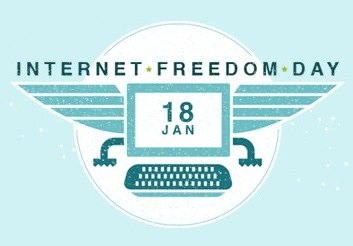News, censorship and defiance on Internet Freedom Day

One year ago today, the largest internet coalition in history came together to stop lawmaking that threatened a free and open Internet.
Digital rights and free speech groups around the world have established January 18th, 2013, as the first official Internet Freedom Day.

To celebrate a free and open internet - and call attention to those who would stand in the way - many organizations and individuals are engaging in activities that are powerful, pointed, and a little bit disobedient.
Right now, the EFF is holding an open Reddit AMA (Ask Me Anything) saying they will answer any question about the issues surrounding Internet Freedom Day and internet censorship.
The Twitter hashtag #InternetFreedomDay is moving fast, as activists of all stripes make their contributions.
The primary Internet Freedom Day website states "Today, celebrate your freedom of expression" and encourages visitors to Tweet or post to Facebook, "What's something you love on the net that you’d never want to see censored?"
Already censored: Martin Luther King's "I Have A Dream" speech
The Internet Freedom Day website suggested this morning that daring Freedom Day supporters share a video of Dr. Martin Luther King Jr.'s "I Have A Dream" speech - originally posted by Fight For The Future as an act of civil disobedience.
Less than a few hours of Kinkg's speech video beginning to go viral Vimeo removed it, leaving this message in its place:
Sorry, "MLK’s “I Have a Dream” speech is copyrighted. Share it anyway."was deleted at 1:03:37 Fri Jan 18, 2013.
Fight For the Future explained that if SOPA passed, Internet users could have been penalized for uploading or sharing King's pivotal speech and "entire websites could have been shut down just for linking to it."
They've got a point: King advocated for civil disobedience as a means to effect change.
The video is copyrighted by EMI, who has been active in enforcing their copyright by taking down versions of King's speech from YouTube.
The Internet Freedom Day website had written,
Engage in a small act of civil disobedience and share this video of Dr. Martin Luther King Jr.’s historic “I Have a Dream” speech. Dr. King’s call for racial justice is as relevant today as it was in 1963. Because this speech is copyrighted, if SOPA had passed, entire websites could have been shut down just for linking to it. This speech is too important to be censored by broken copyright laws. Please share it today.
Internet Freedom Day's website also has a list of things internet citizens can to in support of the values behind the day, such as: Sign the Declaration of Internet Freedom, Demand a privacy law update to stop the government from reading your email without a warrant, and more.
Fight For The Future promotes The Internet Defense League, reminds us that even still The ITU could put the Internet behind closed doors.
Internet Freedom Day is the one-year anniversary of a global online protest that shook the foundations of the way lawmakers do business, and attempt to control constituents, today.
On January 18, 2012, many websites including Wikipedia, Google and Reddit went "dark" censoring themselves to show what the internet would look like under the then-proposed, malfeasant legislation known as the Stop Online Piracy Act (SOPA) and Protect Intellectual Property Act (PIPA) These were both set to be quietly passed by the U.S. Congress.
One year ago #SOPA was stopped dead in its tracks. Today we celebrate and commemorate #internetfreedomday internetfreedomday.net
— creativecommons (@creativecommons) January 18, 2013
Both SOPA and PIPA had been revealed to be designed to put the financial interests of the entertainment industry ahead of the rights of all those who enjoy the free and open Internet.
Congress was flooded by millions of phone calls and emails from angry constituents. Before the day was over, dozens of congressmen and congresswomen dropped their support for the bills, or came out in active opposition.
On January 18th, we celebrate Internet Freedom Day--as a reminder of the threats to our digital rights--and to remember how powerful we are as an international coalition.
The initial campaigns to stop SOPA and PIPA were launched by Demand Progress, founded by Aaron Swartz around that initial purpose in conceiving an online petition, "(...) in opposition to the Combating Online Infringements and Counterfeits Act, and then the ensuing 18 months of activism that helped bring down SOPA and PIPA."
#InternetFreedomDay is bittersweet. @aaronsw played a big part in helping to defeat #SOPA. He won't be there to help us wage future battles.
— Marcia Hofmann (@marciahofmann) January 18, 2013
The EFF has a great post outlining a few upcoming battles over Internet freedom, and include a new strike to reform computer crime law. EFF writes,
The Internet has been in mourning this week as one of its true innovators and pioneers, Aaron Swartz, took his own life at the age 26.
(...) At the time of his death, Aaron was facing a relentless and unjust prosecution under the outdated and draconian Computer Fraud and Abuse Act for the supposed “crime” using MIT's computer network to download millions of academic articles from the online archive JSTOR, allegedly without "authorization."
EFF, along with a multitude of other groups, have taken a bill written by Rep. Zoe Lofgren and written the first draft of what we hope will become known as “Aaron’s Law” — which will go a long ways in preventing a similar situation from happening to a freedom fighter like Aaron again. You can take action and email your members of Congress to tell them to support reform of the Computer Fraud and Abuse Act here.